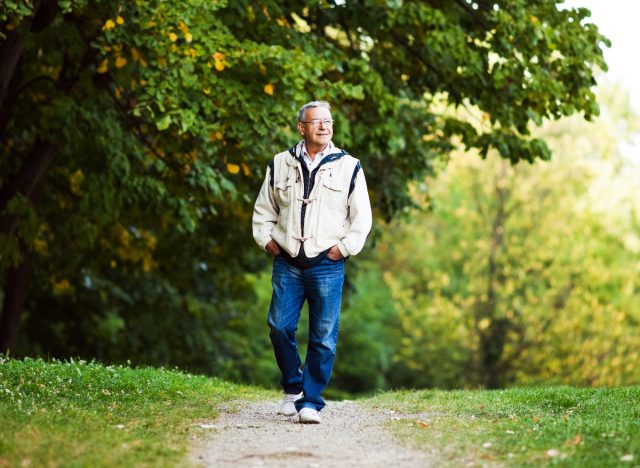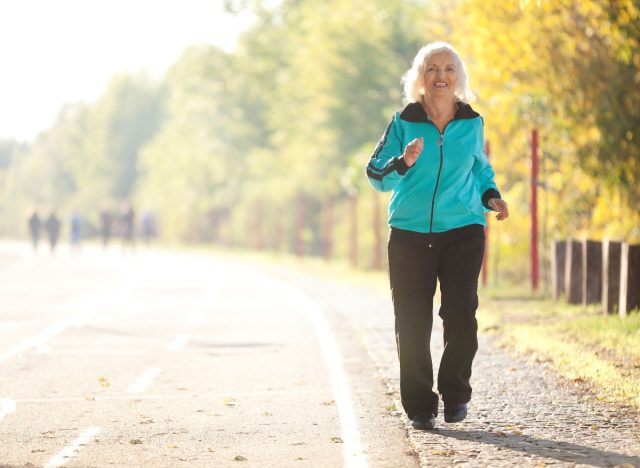If You Want To Become a Centenarian, Start Doing This Exercise

There’s a new study that was performed in South Korea, and the news will make you want to put on your sneakers and get in some steps. The research indicates that walking for one hour each week—around just 9 minutes each day—is shown to increase longevity in individuals 85 years of age and up. That’s right! If you want to become a centenarian, you’ll want to get off the couch and start walking ASAP. Read on to learn more about this motivating study.
There are certain fitness guidelines to meet, even though it’s common to become sedentary as you age and activity decreases.

When it comes to the general health and fitness guidelines for adults, it’s recommended to get in 2.5 hours of moderately intense physical activity or 1 hour and 15 minutes of vigorous exercise each week (along with two or more days of muscle-strengthening exercise). On the contrary, it’s incredibly common to become sedentary as you age and activity decreases.
Related: The Lifestyle Habits That Slow Down Aging, From a 100-Year-old Neurologist
This new study indicates that walking can result in longevity.

The author of the recent study, Dr. Moo-Nyun Jin of the Inje University Sanggye Paik Hospital, explains, “Adults are less likely to meet activity recommendations as they get older. Our study suggests that walking at least one hour every week is beneficial for people aged 85 years and older. Put simply, walk for 10 minutes every day.”
The researchers observed the data of over 7,000 adults over 85 years of age (averaging 87, and 2/3 female), to learn how walking can result in longevity. The records included participant information from the Korean National Health Screening Program for a five-year period.
The participants answered questions regarding the physical activity they perform in their leisure time. The survey questioned how long each individual spent getting in strides at a leisurely pace, the time spent performing moderately intense activities like walking briskly or bicycling, and the extent of vigorous exercises such as running.
The group was separated into five sections based on how long the individuals walked leisurely every week. Over half (57.5%) of the individuals performed no leisurely walking. The breakout was as follows: 8.5% walked for less than 60 minutes, 12% did their walking for one to two hours, 8.7% got in their strides for two to three hours, and 13.3% walked for over three hours each week. Approximately 14.7% (one out of seven) participants performed moderately intense exercise, 10.9% performed vigorous physical activity, and 7.6% performed the general recommendations for physical activity at a moderate/vigorous intensity. As much as 33% of the group (999 participants) who walked at a leisurely pace each week also performed exercise at a moderate/vigorous intensity.
Walking every week can lower your risk of dying by as much as 40%.

The study includes the relationships between walking and death. The participants who walked a minimum of one hour each week had a 39% to 40% decreased risk of death. So if you want to become a centenarian and lengthen your lifespan, we highly suggest putting on your sneakers and getting in those strides.
Dr. Jin points out, “Walking was linked with a lower likelihood of dying in older adults, regardless of whether or not they did any moderate-to-vigorous intensity physical activity. Identifying the minimum amount of exercise that can benefit the oldest old is an important goal since recommended activity levels can be difficult to achieve. Our study indicates that walking even just one hour every week is advantageous to those aged 85 years and older compared to being completely inactive. The take home message is to keep walking throughout life.”
Related: The 5 Best Exercises To Lose Belly Fat and Slow Aging, Says Fitness Expert
If you want to become a centenarian, you should eat like one, too.

If you want to become a centenarian, it’s safe to say, exercise is key—science says so. You can also take notes on the healthy eating habits of the world’s longest-living people who reside in the Earth’s “Blue Zones.” The Blue Zones Food Guidelines include making sure 95% of your food is plant-based, staying away from meat (only eating it a max of two times a week), consuming up to three ounces of fish on a daily basis, eating a minimum of 1/2 cup of cooked beans every day, and cutting out dairy from your diet.








